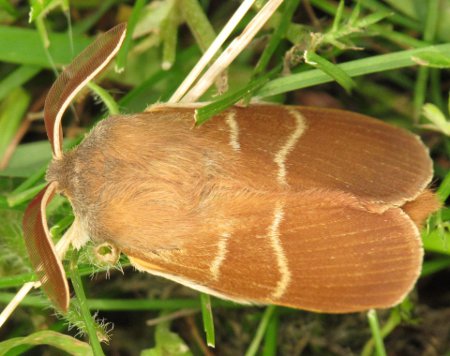Bombyx de la ronce : Différence entre versions
m (A déprotégé « Bombyx de la ronce ») |
|||
| Ligne 1 : | Ligne 1 : | ||
[[Category:Insectes]] | [[Category:Insectes]] | ||
| − | <br> Bombyx de la ronce ''Macrothylacia rubi'' - | + | [[Image:Macrothylacia_rubi.jpg]]<br> Bombyx de la ronce ''Macrothylacia rubi'' - |
====== Etymologie ====== | ====== Etymologie ====== | ||
| Ligne 26 : | Ligne 26 : | ||
*Friches, landes, bruyères, bois clairs, haies. | *Friches, landes, bruyères, bois clairs, haies. | ||
| + | |||
====== Ecologie ====== | ====== Ecologie ====== | ||
| + | |||
*'''Période de vol''' : mai-juillet (1 génération) | *'''Période de vol''' : mai-juillet (1 génération) | ||
*Les mâles sont actifs jour et nuit, les femelles, la nuit. | *Les mâles sont actifs jour et nuit, les femelles, la nuit. | ||
| + | |||
====== Statut ====== | ====== Statut ====== | ||
| + | |||
*Pas de statut de protection connu. | *Pas de statut de protection connu. | ||
| − | ====== Bibliographie ====== | + | |
| + | ====== Bibliographie ====== | ||
| + | |||
*Bebbington John & Lewington Richard (2007) - '''Guide to the hawkmoths of the British Isles'''. Edition Field Studies Council (FSC). | *Bebbington John & Lewington Richard (2007) - '''Guide to the hawkmoths of the British Isles'''. Edition Field Studies Council (FSC). | ||
*Leraut Patrice (2006) - '''Papillons de nuit d'Europe, bombyx, sphinx, écailles...''' VOL I. NAP éditions. | *Leraut Patrice (2006) - '''Papillons de nuit d'Europe, bombyx, sphinx, écailles...''' VOL I. NAP éditions. | ||
Version du 23 septembre 2015 à 08:26

Bombyx de la ronce Macrothylacia rubi -
Sommaire
Etymologie
- Nom latin : Macrothylacia rubi
- Autres noms : la "polyphage" ou "Anneau du diable" désignent la chenille.
- Nom anglais : Fox Moth.
- Famille : Lasiocampidae
Description
- Taille: 18-25 mm (mâle).
Plantes hôtes
- Chenille sur ronces, divers sous-arbrisseaux, herbacées Fragaria sp., Potentilla sp., ...
Répartition
- Europe occidentale, Asie centrale.
- France : commun.
Habitat
- Friches, landes, bruyères, bois clairs, haies.
Ecologie
- Période de vol : mai-juillet (1 génération)
- Les mâles sont actifs jour et nuit, les femelles, la nuit.
Statut
- Pas de statut de protection connu.
Bibliographie
- Bebbington John & Lewington Richard (2007) - Guide to the hawkmoths of the British Isles. Edition Field Studies Council (FSC).
- Leraut Patrice (2006) - Papillons de nuit d'Europe, bombyx, sphinx, écailles... VOL I. NAP éditions.
- Leraut Patrice (2009) - Papillons de nuit d'Europe, géomètres VOL II. NAP éditions.
- Lewington Richard (2006) - Guide to the day-flying moths of Britain. Edition Field Studies Council (FSC)
- Manley Chris (2008) - British moths and butterflies, a photographic guide. Edition A & C Black.
- Robineau Roland (2007) -Guide des papillons nocturnes de France, plus de 1620 espèces décrites et illustrées. Edition Delachaux & Niestlé.
- Skinner Bernard (2009) -Colour identification guide to moths of the British isles. Edition Apollo Books.
- Townsend M. & Waring P. (2007) -Concise guide to the moths of great Britain and Ireland. Edition British Wildlife Publishing
- Waring Paul & Townsend Martin (2009)- Field guide to the moths of great Britain and Ireland. Edition British Wildlife Publishing.
- Young Mark (1997) -Natural History of Moths. Edition T & AD Poyser Ltd (A & C Black).